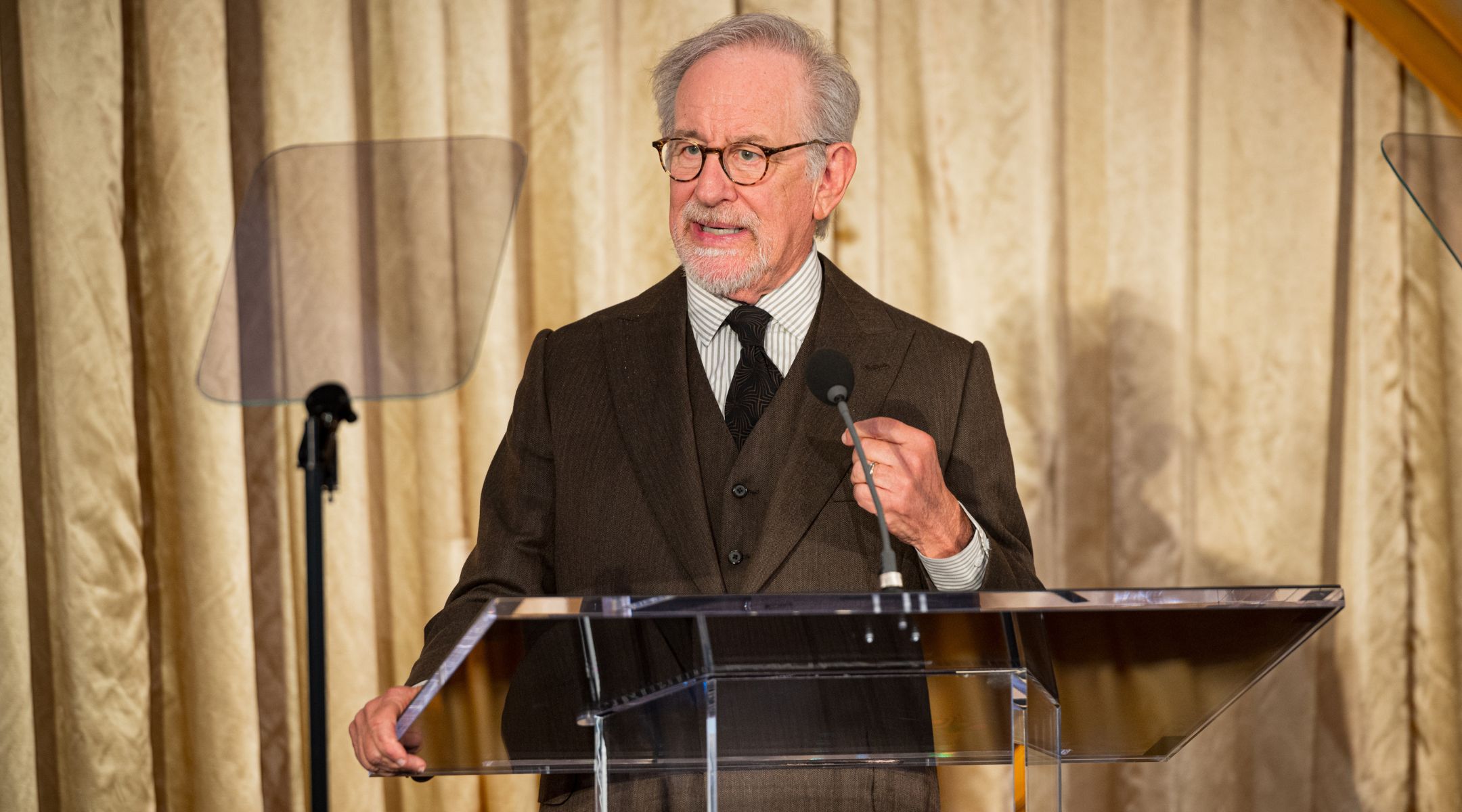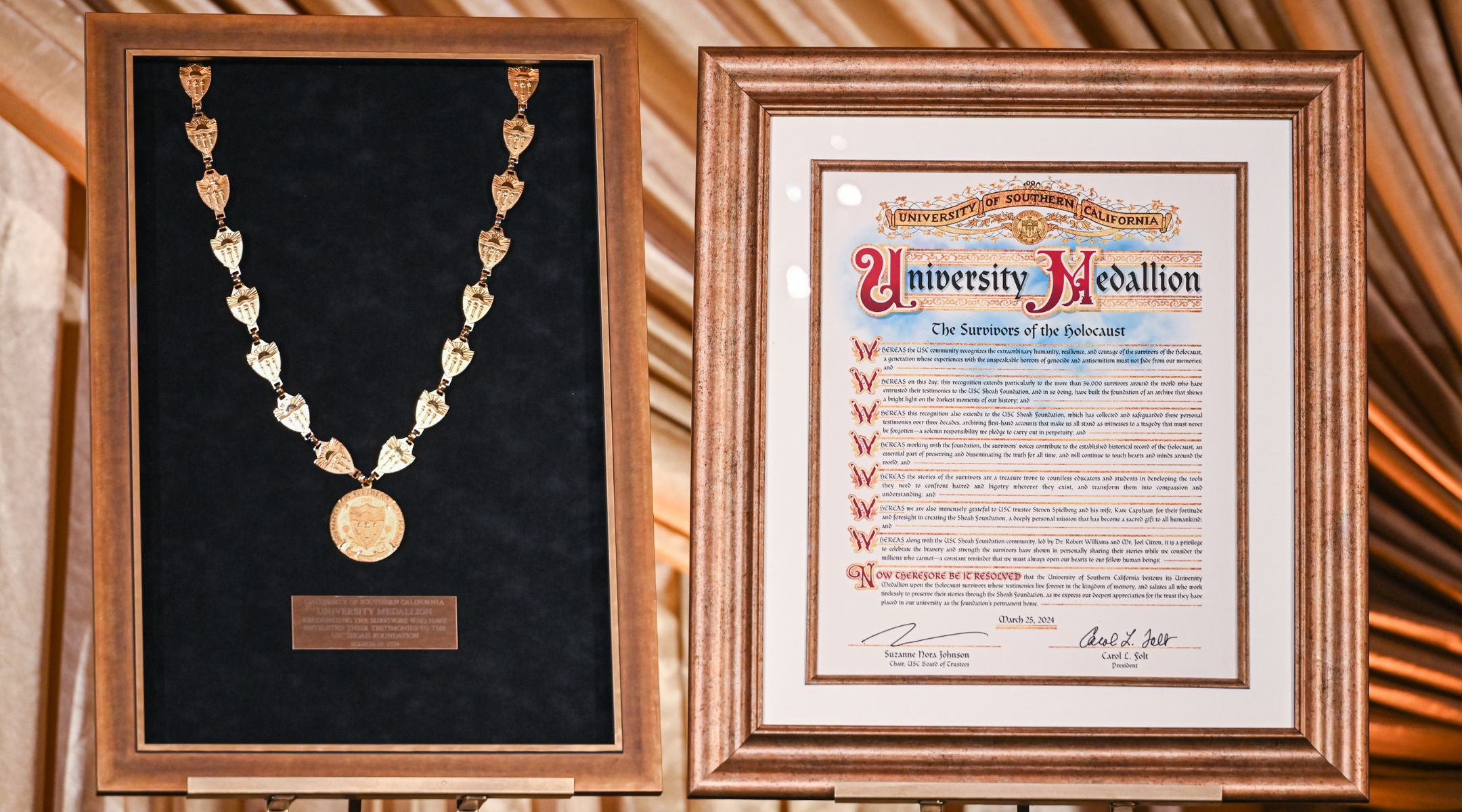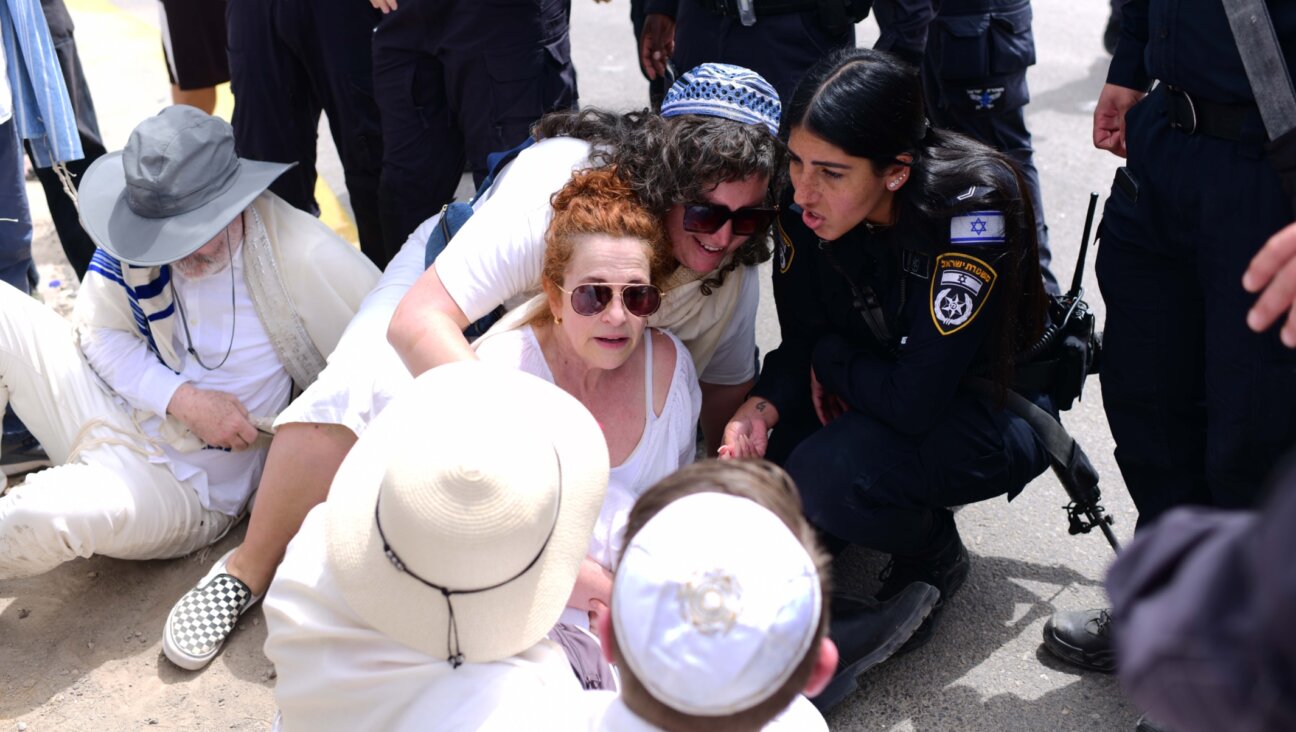Steven Spielberg decries ‘machinery of extremism’ on campus and laments Israel-Hamas war deaths at USC ceremony honoring Holocaust survivors

Steven Spielberg speaks at a ceremony at the University of Southern California, March 25, 2024, in Los Angeles. (USC/Sean Dube)
LOS ANGELES (JTA) — Steven Spielberg warned that “the machinery of extremism is being used on college campuses” and lamented those killed in Israel and Gaza while being honored for his Holocaust remembrance work at the University of Southern California.
The renowned Jewish filmmaker spoke at a ceremony Monday afternoon in which USC bestowed its prestigious University Medallion on the 56,000 Holocaust survivors who have provided testimony to the USC Shoah Foundation, which Spielberg founded three decades ago. Thirty of the survivors were present at the ceremony. The award’s text also says the school is “immensely grateful” to Spielberg and his wife, Kate Capshaw.
In his speech, Spielberg lamented polling showing high rates of antisemitism on college campuses. He also condemned other forms of hatred, including anti-Arab, anti-Muslim and anti-Sikh discrimination.
“We see every day how the machinery of extremism is being used on college campuses,“ Spielberg said. Moments later, he said, “Those who cannot remember the past are condemned to repeat it. And I am increasingly alarmed that we may be condemned to repeat history, to once again have to fight for the very right to be Jewish.”
He added, “The creation of the other, and the dehumanization of any group based on their differences, is the foundation of fascism.”
Jewish watchdog organizations and law enforcement agencies have documented a rise in antisemitism since the outbreak of the Israel-Hamas war on Oct. 7, when the terror group invaded Israel. Recently, along with its Holocaust memory work, the Shoah Foundation has begun collecting testimony from Oct. 7 survivors. Spielberg called the attack “horrific.”
“In the face of brutality and persecution, we have always been a resilient and compassionate people, who all understand the power of empathy,” Spielberg said. “We can rage against the heinous acts committed by the terrorists of Oct. 7, and also decry the killing of innocent women and children in Gaza. This makes us a unique force for good in the world, and is why we are here today.”

The University of Southern California’s “University Medallion,” which it bestowed upon Holocaust survivors and the USC Shoah Foundation. (USC/Sean Dube)
Spielberg created the Shoah Foundation after making his 1993 Oscar-winning Holocaust film, “Schindler’s List.” Portions of his remarks on Monday overlap with a controversial speech given by Jonathan Glazer, the writer and director of another acclaimed film set at Auschwitz, last year’s “The Zone of Interest.”
Upon accepting the Oscar for best foreign film earlier this month, Gazer also decried “dehumanization” and lamented “the victims of October the 7th in Israel or the ongoing attack on Gaza.”
But critics have primarily taken umbrage at Glazer saying, immediately beforehand, “Right now we stand here as men who refute their Jewishness and the Holocaust being hijacked by an occupation which has led to conflict for so many innocent people.” A range of Jewish and pro-Israel public figures and organizations have condemned the speech, while others have defended Glazer’s remarks.
No such controversy was apparent on Monday at USC, which has housed the Shoah Foundation since 2006. Spielberg said the work of the foundation has increased in importance following Oct. 7.
“It is crucial to the stopping of political violence caused by misinformation, conspiracy theories and ignorance,” Spielberg said of the Shoah Foundation’s efforts. “It is crucial because stopping the rise of antisemitism and hate of any kind is critical to the health of our democratic republic and the future of democracy all over the civilized world.”
Spielberg said that at a recent gathering of survivors, one woman “shared what I know so many of us are wishing: that those who are currently being held hostage in Gaza should be safe and have hope that they should return home.”
Holocaust survivor Celina Biniaz, who Spielberg introduced at the ceremony, was saved by Oskar Schindler, whose story is told in “Schindler’s List.” Biniaz said she did not talk about her experience during the Holocaust — including with her own children — until the film inspired her to speak out.
“Oskar Schindler saved my life by adding my name and that of my parents to the list of workers who were to be protected from the Nazi deportation,” Biniaz, who survived Auschwitz, said during her remarks. “And 50 years later, you, Steven, recorded my life by giving me back my voice.”
In addition to Spielberg and Biniaz, attendees heard from USC President Carol Folt and leaders of the Shoah Foundation. The program ended with a conversation between a USC student athlete and Holocaust and 1972 Munich Olympics massacre survivor Shaul Ladany. Spielberg’s 2005 film “Munich” is about the Israeli response to that massacre.
The award “goes to honor those who have made exceptional contributions to USC and to society and to humankind,” Folt said in her speech. “The 56,000 testimonies from survivors of the Holocaust are one of the greatest contributions to humanity.”
This article originally appeared on JTA.org.

I hope you appreciated this article. Before you go, I’d like to ask you to please support the Forward’s award-winning journalism this Passover.
In this age of misinformation, our work is needed like never before. We report on the news that matters most to American Jews, driven by truth, not ideology.
At a time when newsrooms are closing or cutting back, the Forward has removed its paywall. That means for the first time in our 126-year history, Forward journalism is free to everyone, everywhere. With an ongoing war, rising antisemitism, and a flood of disinformation that may affect the upcoming election, we believe that free and open access to Jewish journalism is imperative.
Readers like you make it all possible. Right now, we’re in the middle of our Passover Pledge Drive and we still need 300 people to step up and make a gift to sustain our trustworthy, independent journalism.
Make a gift of any size and become a Forward member today. You’ll support our mission to tell the American Jewish story fully and fairly.
— Rachel Fishman Feddersen, Publisher and CEO
Join our mission to tell the Jewish story fully and fairly.
Only 300 more gifts needed by April 30






















